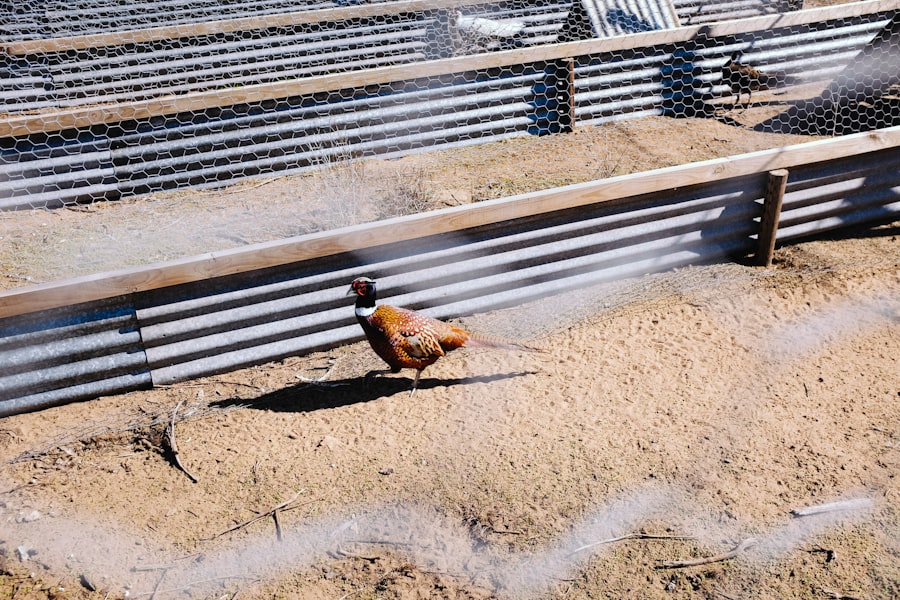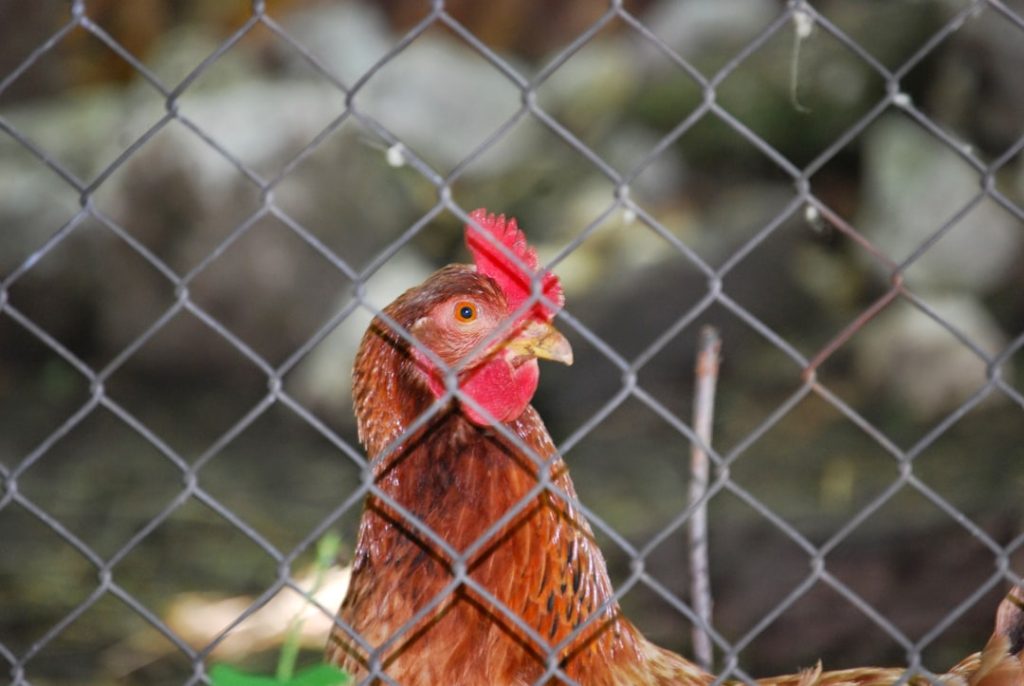Chickens are inherently inquisitive and gregarious animals, often attracted to locations that provide food, water, and shelter. They exhibit habitual behavior, consistently returning to familiar roosting areas each night. Understanding these natural tendencies is essential for effectively deterring chickens from roosting on porches.
Chickens maintain a strict social hierarchy within their flock. When one chicken discovers a comfortable roosting spot, such as a porch, others are likely to follow. Additionally, chickens possess excellent visual acuity and are drawn to light, making well-illuminated porches particularly attractive roosting locations.
These behavioral characteristics of chickens, including their social nature, habitual tendencies, hierarchical structure, and visual preferences, are crucial factors to consider when implementing strategies to discourage them from roosting on porches. By addressing these aspects, it becomes possible to redirect chicken behavior towards more appropriate roosting areas.
Table of Contents
- 1 Creating Physical Barriers
- 2 Using Deterrents
- 3 Providing Alternative Roosting Spots
- 4 Implementing Training Techniques
- 5 Keeping Food and Water Away from the Porch
- 6 Regularly Monitoring and Adjusting Strategies
- 7 FAQs
- 7.1 What are some effective methods for keeping chickens off the porch?
- 7.2 Why is it important to keep chickens off the porch?
- 7.3 Are there any natural deterrents that can be used to keep chickens away from the porch?
- 7.4 How can I train my chickens to stay away from the porch?
- 7.5 What are the benefits of keeping chickens off the porch?
Key Takeaways
- Chickens have natural behaviors that can be managed with proper understanding and training
- Physical barriers such as fences and netting can prevent chickens from roosting on porches
- Deterrents like motion-activated sprinklers or noise devices can discourage chickens from roosting
- Providing alternative roosting spots like designated perches or shelters can redirect chickens away from porches
- Training techniques such as positive reinforcement can help teach chickens to roost in designated areas
- Keeping food and water away from the porch can reduce the incentive for chickens to roost there
- Regularly monitoring and adjusting strategies is important for long-term success in managing chicken behavior around porches
Creating Physical Barriers
Chickens on your porch can be a nuisance, but there are ways to deter them from roosting in the area. One effective method is to create physical barriers that prevent them from accessing the porch.
Blocking Access with Wire Mesh or Netting
Installing wire mesh or netting around the perimeter of the porch is a great way to block chickens from entering the area. This physical barrier can be highly effective in preventing them from roosting on your porch.
Covering Openings and Gaps
In addition to blocking access, it’s essential to cover any openings or gaps where chickens may be able to squeeze through. Chicken wire or hardware cloth can be used to cover these areas, ensuring that chickens cannot find a way onto your porch.
Using Motion-Activated Sprinklers
Another effective physical barrier is the use of motion-activated sprinklers. These devices detect movement and spray a burst of water, startling and deterring chickens from the area. By strategically placing these sprinklers around the porch, you can create a deterrent that discourages chickens from roosting in the vicinity.
Using Deterrents

In addition to physical barriers, there are also various deterrents that can be used to discourage chickens from roosting on your porch. One effective deterrent is the use of reflective surfaces, such as aluminum foil or reflective tape, which can be hung around the porch to create a visual deterrent for the chickens. The reflective surfaces will catch the light and create a visual disturbance that can deter the chickens from roosting in the area.
Another effective deterrent is the use of natural repellents, such as citrus peels or essential oils with strong scents that chickens find unpleasant. By placing these natural repellents around the porch, you can create an olfactory deterrent that discourages chickens from roosting in the area. Additionally, there are also commercial repellent sprays available that are specifically designed to deter chickens and other birds from roosting in unwanted areas.
By using these deterrents, you can effectively discourage chickens from making your porch their nightly roosting spot.
Providing Alternative Roosting Spots
One way to deter chickens from roosting on your porch is to provide alternative roosting spots that are more suitable for them. This can be achieved by installing roosting bars or platforms in the chicken coop or other designated areas where the chickens can roost comfortably. By providing alternative roosting spots that are more appealing to the chickens, you can redirect their behavior away from the porch and towards more suitable areas.
Another way to provide alternative roosting spots for chickens is to create cozy and secure shelters in the chicken coop or other designated areas. By providing comfortable and secure shelters, you can encourage the chickens to roost in these areas instead of on your porch. Additionally, you can also consider adding extra bedding or nesting materials to make these alternative roosting spots even more appealing to the chickens.
By providing alternative roosting spots that meet the chickens’ needs, you can effectively redirect their behavior away from your porch.
Implementing Training Techniques
Training techniques can also be used to deter chickens from roosting on your porch. One effective training technique is the use of positive reinforcement, where you reward the chickens for roosting in designated areas and discourage them from roosting on the porch. This can be achieved by providing treats or other rewards when the chickens roost in the designated areas, while also using deterrents such as loud noises or gentle shooing when they attempt to roost on the porch.
Another training technique is the use of visual or auditory cues to signal to the chickens where they should roost. This can be achieved by using visual markers or playing soothing music near the designated roosting areas to encourage the chickens to roost there instead of on the porch. By implementing these training techniques, you can effectively redirect the chickens’ behavior and discourage them from roosting on your porch.
Keeping Food and Water Away from the Porch

Keep Food and Water Away
Chickens are often drawn to areas where they can find food and water, so keeping these resources away from the porch is a great starting point. This can be achieved by placing feeders and waterers in designated areas away from the porch, such as in the chicken coop or other suitable locations. By keeping food and water away from the porch, you can reduce the attractiveness of the area as a roosting spot for the chickens.
Clean Up Spills Promptly
Another way to keep food and water away from the porch is to ensure that any spilled feed or water is promptly cleaned up. This will help prevent the accumulation of food and water around the porch, further reducing its appeal as a roosting spot for the chickens. Additionally, you can also consider using feeders and waterers with covers or lids to prevent spillage and keep the area around the porch clean and unattractive to the chickens.
Effective Deterrent
By keeping food and water away from the porch, you can effectively discourage chickens from roosting in the area. This simple yet effective method can help keep your porch chicken-free and reduce the mess and noise that comes with it.
Regularly Monitoring and Adjusting Strategies
Finally, it’s important to regularly monitor and adjust your strategies for deterring chickens from roosting on your porch. This may involve observing the chickens’ behavior and making note of any patterns or changes in their roosting habits. By staying vigilant and observant, you can identify any new attempts by the chickens to roost on the porch and take proactive measures to deter them.
Additionally, it’s important to be flexible and willing to adjust your strategies as needed. If certain deterrents or training techniques are not proving effective, it may be necessary to try different approaches until you find what works best for deterring the chickens from roosting on your porch. By regularly monitoring and adjusting your strategies, you can effectively discourage chickens from making your porch their nightly roosting spot.
In conclusion, deterring chickens from roosting on your porch requires an understanding of their behavior and implementing a combination of physical barriers, deterrents, alternative roosting spots, training techniques, and strategic management of food and water resources. By taking proactive measures and regularly monitoring and adjusting your strategies, you can effectively discourage chickens from making your porch their nightly hangout spot. With patience and persistence, you can create a peaceful and chicken-free porch environment for yourself and your family to enjoy.
If you’re struggling with keeping chickens from getting on your porch, you may also be interested in learning about the mating season for ducks. Check out this article to gain insight into the behavior of ducks and how to manage them on your property.
FAQs
What are some effective methods for keeping chickens off the porch?
Some effective methods for keeping chickens off the porch include installing physical barriers such as fences or gates, using repellents such as citrus peels or vinegar, and training the chickens to avoid the porch area.
Why is it important to keep chickens off the porch?
Keeping chickens off the porch is important to prevent damage to the porch and its furnishings, as well as to maintain a clean and sanitary living environment.
Are there any natural deterrents that can be used to keep chickens away from the porch?
Yes, natural deterrents such as citrus peels, vinegar, or cayenne pepper can be effective in keeping chickens away from the porch.
How can I train my chickens to stay away from the porch?
You can train your chickens to stay away from the porch by using positive reinforcement, such as providing treats in areas away from the porch, and by using negative reinforcement, such as making loud noises or using a water sprayer when the chickens approach the porch.
What are the benefits of keeping chickens off the porch?
Keeping chickens off the porch can help prevent damage to the porch and its furnishings, reduce the risk of spreading diseases or parasites, and maintain a more pleasant and clean living environment.

Meet Walter, the feathered-friend fanatic of Florida! Nestled in the sunshine state, Walter struts through life with his feathered companions, clucking his way to happiness. With a coop that’s fancier than a five-star hotel, he’s the Don Juan of the chicken world. When he’s not teaching his hens to do the cha-cha, you’ll find him in a heated debate with his prized rooster, Sir Clucks-a-Lot. Walter’s poultry passion is no yolk; he’s the sunny-side-up guy you never knew you needed in your flock of friends!


Meet Walter, the feathered-friend fanatic of Florida! Nestled in the sunshine state, Walter struts through life with his feathered companions, clucking his way to happiness. With a coop that’s fancier than a five-star hotel, he’s the Don Juan of the chicken world. When he’s not teaching his hens to do the cha-cha, you’ll find him in a heated debate with his prized rooster, Sir Clucks-a-Lot. Walter’s poultry passion is no yolk; he’s the sunny-side-up guy you never knew you needed in your flock of friends!







